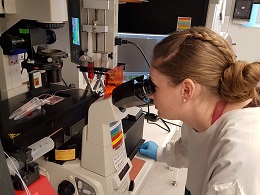14 June 2018
 A wide range of fetal genetic abnormalities could soon be detected in early pregnancy thanks to a world-first study led by University of South Australia researchers using lab-on-a-chip, non-invasive technology.
A wide range of fetal genetic abnormalities could soon be detected in early pregnancy thanks to a world-first study led by University of South Australia researchers using lab-on-a-chip, non-invasive technology.
Biomedical engineers Dr Marnie Winter and Professor Benjamin Thierry from UniSA’s Future Industries Institute (FII) and the ARC Centre of Excellence in Convergent Bio-Nano Science and Technology (CBNS) are part of a team of researchers who have isolated fetal cells from maternal blood using a tiny microfluidic device, allowing for improved genetic testing.
The technology breakthrough is published today (Thursday 14 June) in Advanced Materials Technologies.
Lab-on-a-chip (LOC) technology integrates laboratory functions on a chip ranging from a few millimetres to a few square centimetres. The special design of the device allows large volumes of blood to be screened, paving the way for an efficient, cheap and quick method of separating fetal cells from maternal blood cells.
“We are hopeful that this device could result in a new, non-invasive prenatal diagnostic test able to detect a wide range of genetic abnormalities in early pregnancy from a simple blood sample,” Dr Winter says.
Currently, prenatal diagnostic tests involve an amniocentesis procedure or taking a sample of cells from the placenta (chorionic villus sampling), both of which carry a risk of inducing miscarriage.
“From about five weeks into the pregnancy, fetal cells originating from the placenta can be found in a mother’s bloodstream. Using modern microfluidic technology, we can now isolate these extremely rare cells (about one in a million) from the mother’s white blood cells and collect them for genetic analysis,” she says.
The UniSA researchers, working in collaboration with Dr Majid Warkiani from the University of Technology Sydney and specialists from the Women’s and Children’s Hospital, SA Pathology and Repromed, adapted the device from one initially developed to isolate tumour cells from the blood of cancer patients.
“Many pregnant women would be aware of the new tests based on circulating fetal DNA that – with a simple blood test – help determine the risk of having a baby with Down syndrome.
“These tests have revolutionised prenatal care, but they can only detect a small subset of genetic conditions and are not always accurate. We hope this LOC technology will be able to reliably detect a greater range of genetic abnormalities, providing more information to families and healthcare providers,” Dr Winter says.
Professor Thierry, who leads UniSA’s Bioengineering group, says there is significant scope to further develop the lab-on-a-chip concept.
“We are collaborating with industry partners to translate this technology in routine clinical prenatal diagnostics and make it available in the future to screen low and medium-risk pregnancies,” he says.
Professor Emily Hilder, Director of UniSA’s FII, says: “This research breakthrough is testament to the cutting-edge technology being developed at the Future Industries Institute. UniSA is a leading player in LOC technology thanks to our ANFF-SA micro and nanofabrication facility at Mawson Lakes.”
Ends
For a copy of the paper please contact UniSA media officer Candy Gibson mobile 0434 605 142 email mailto:candy.gibson@unisa.edu.au


